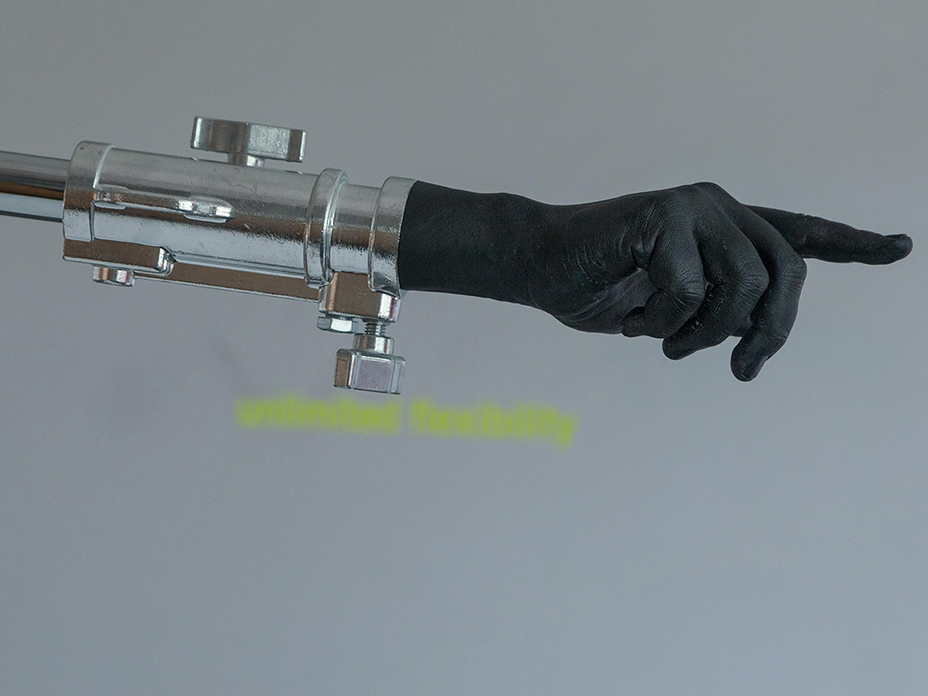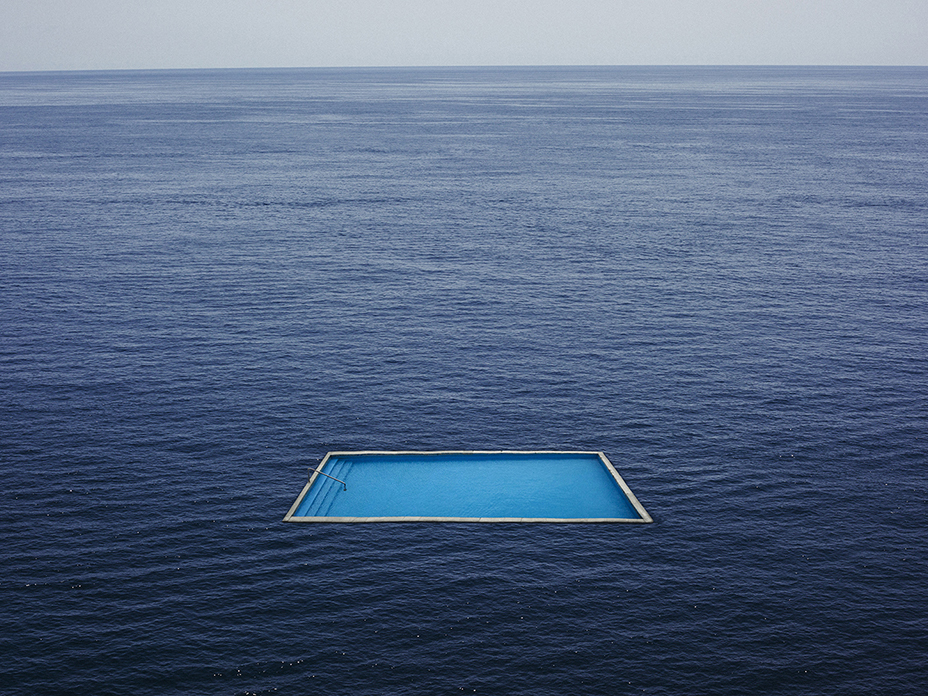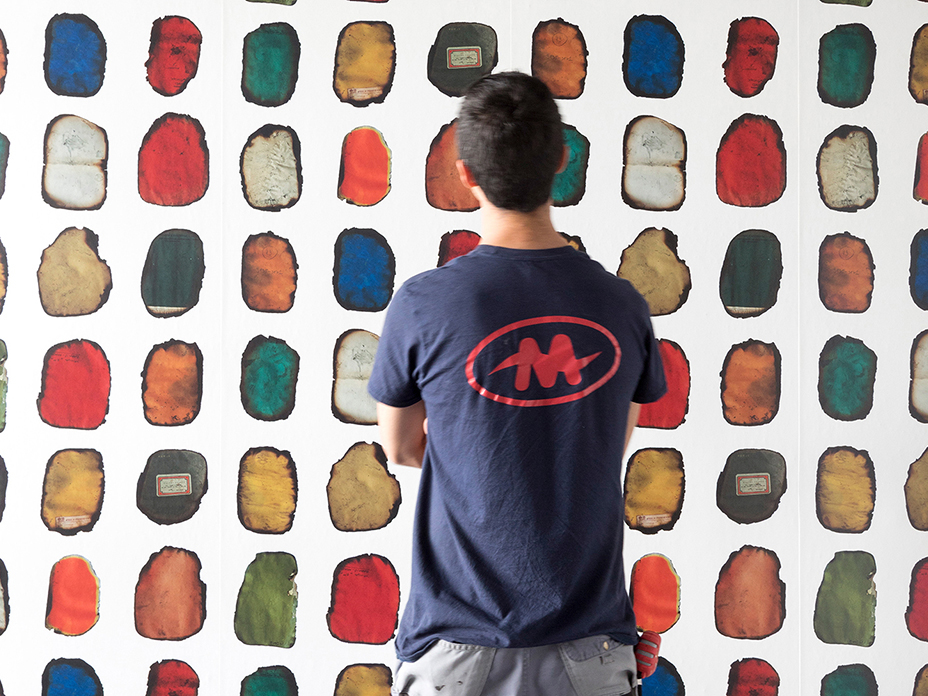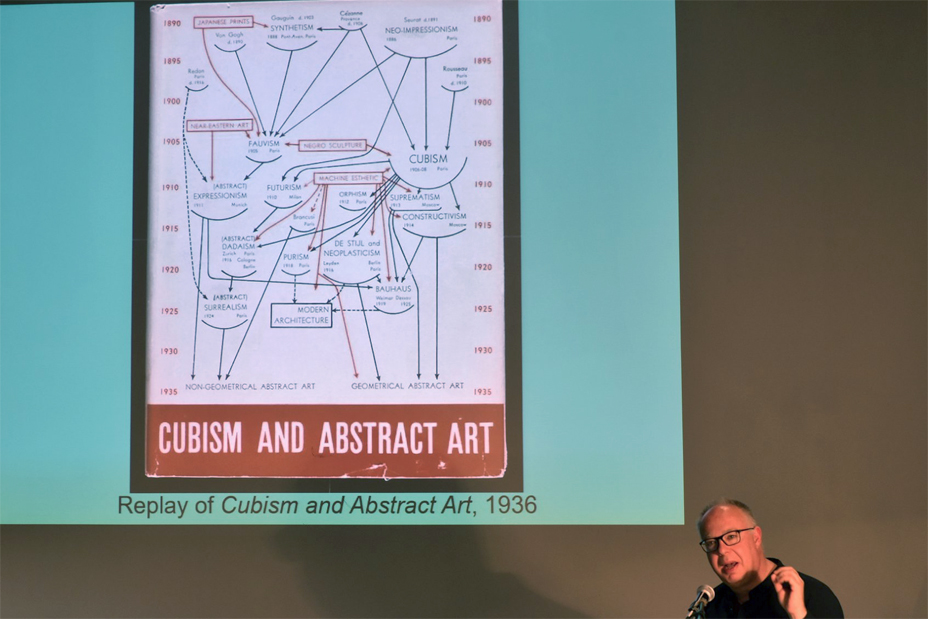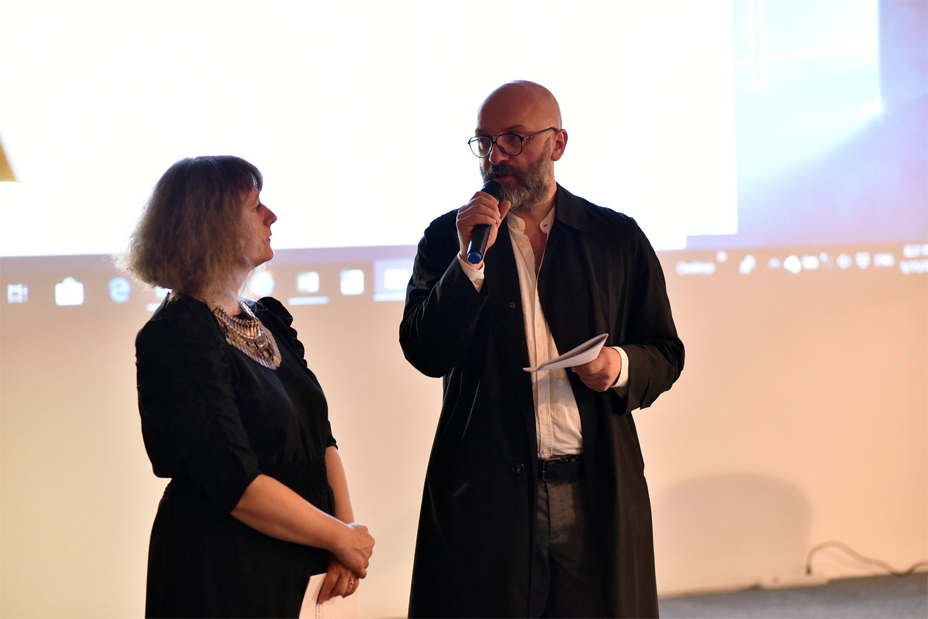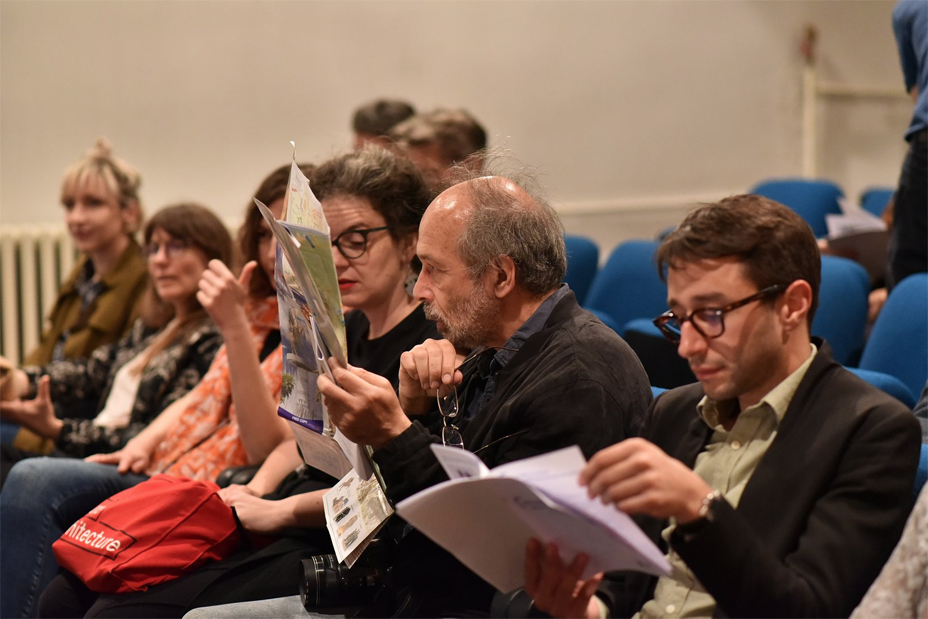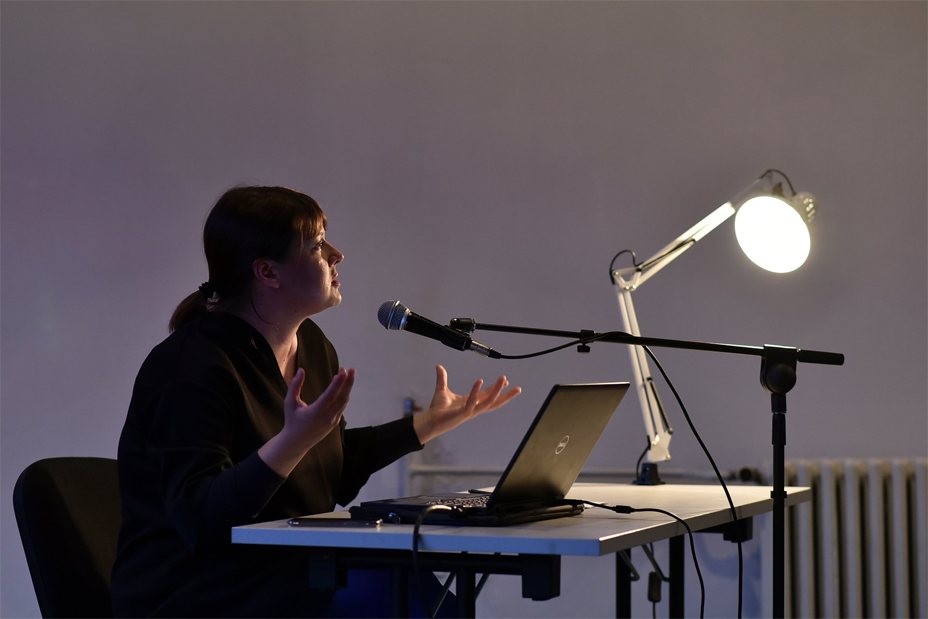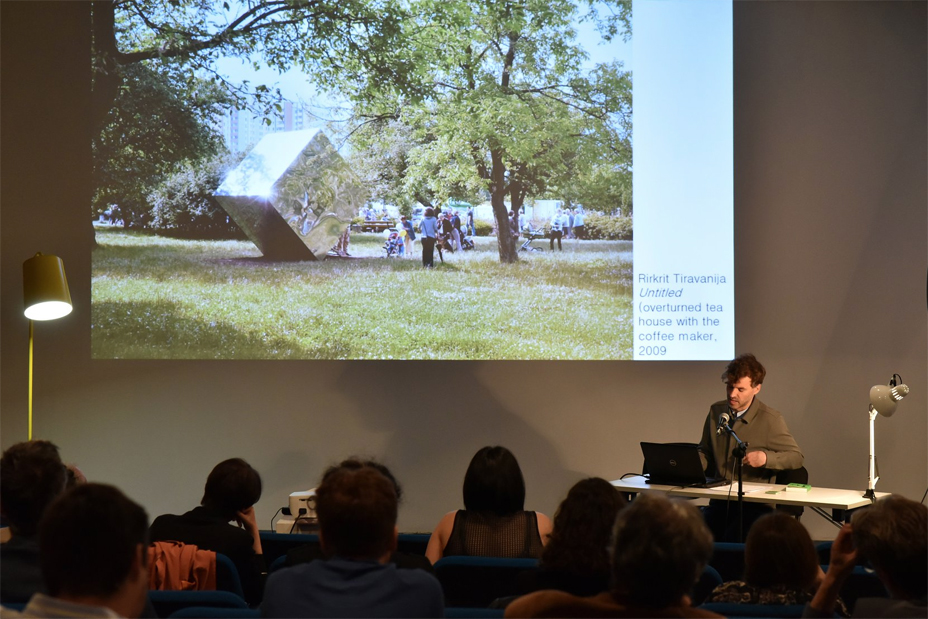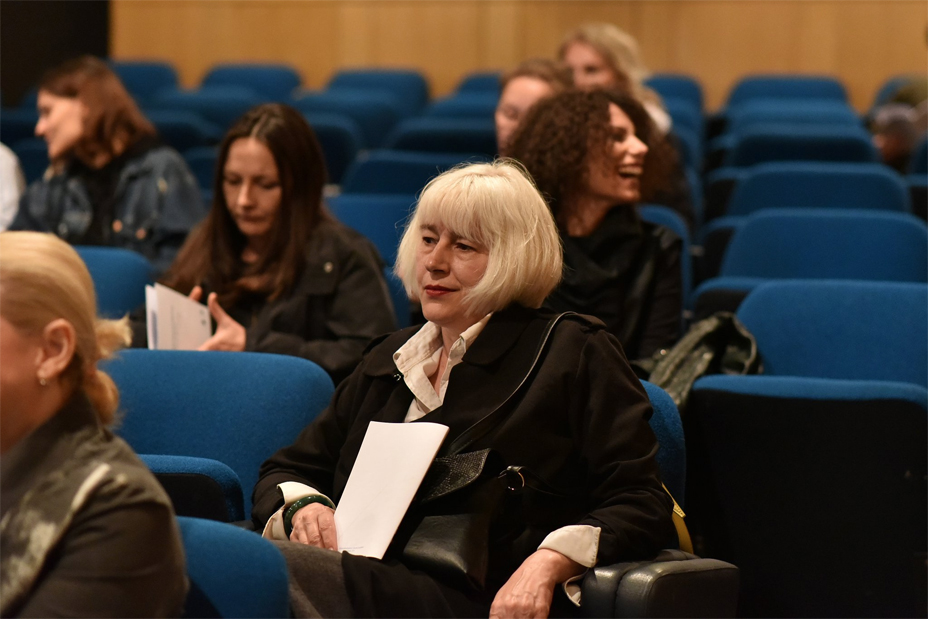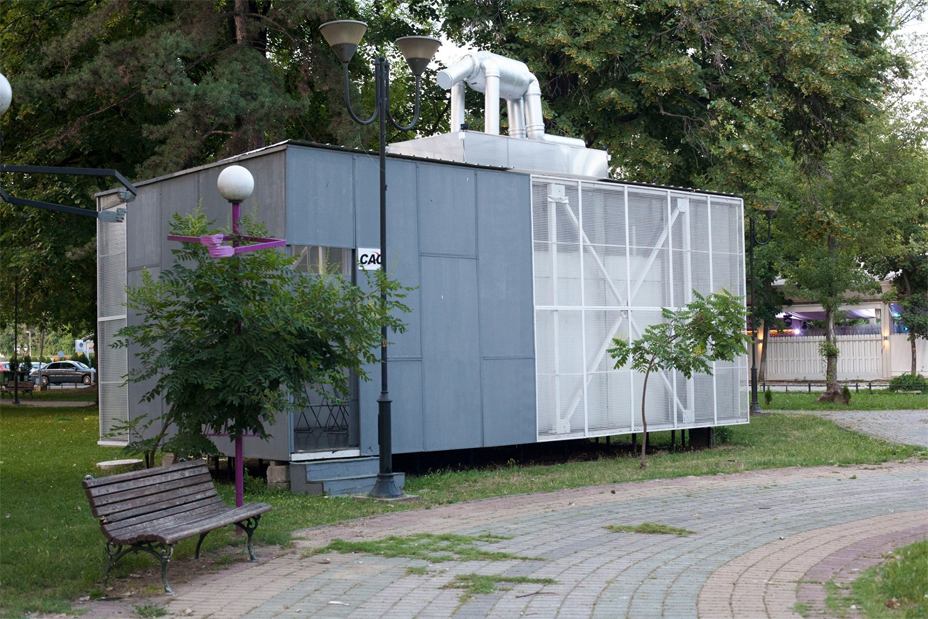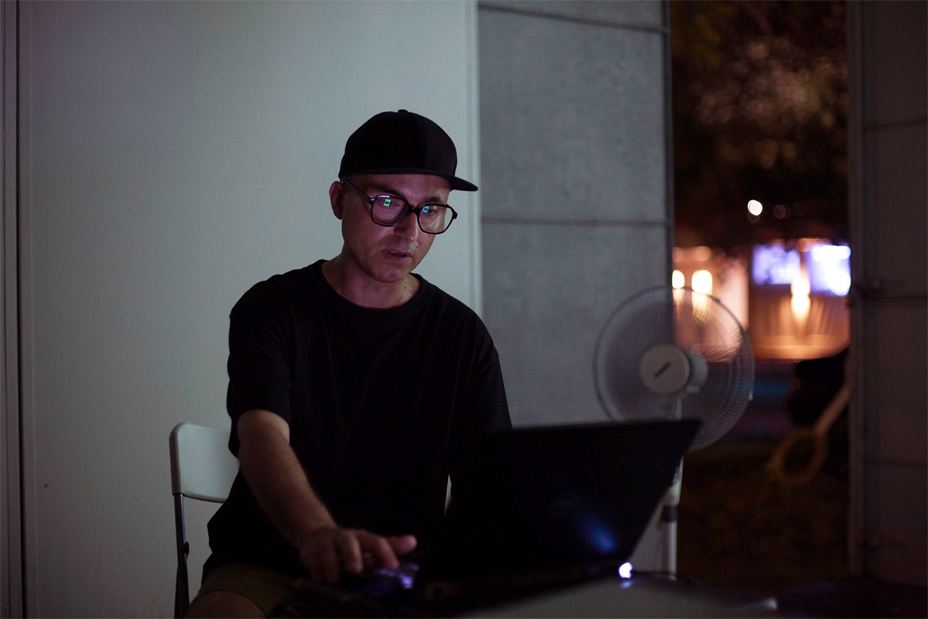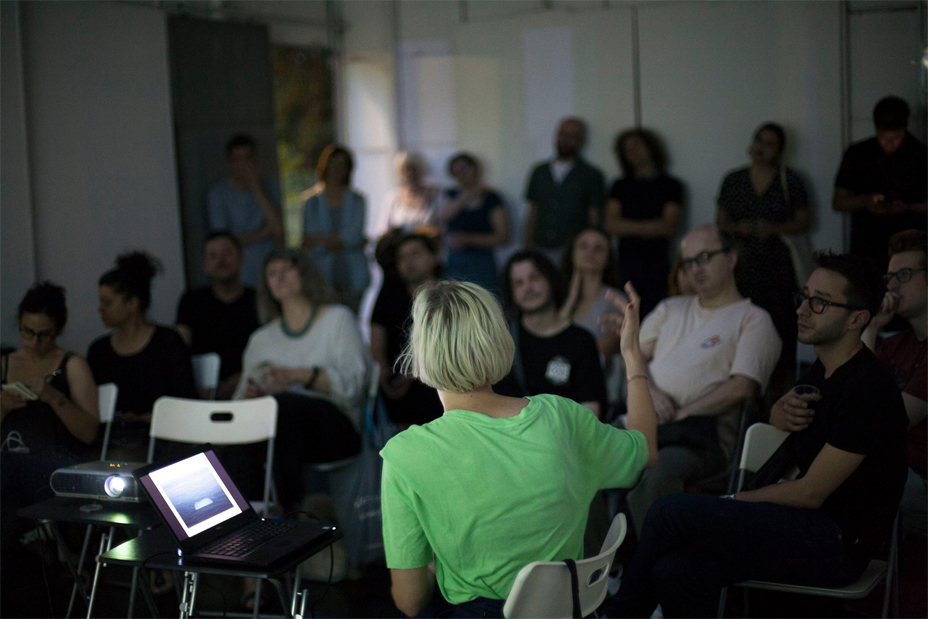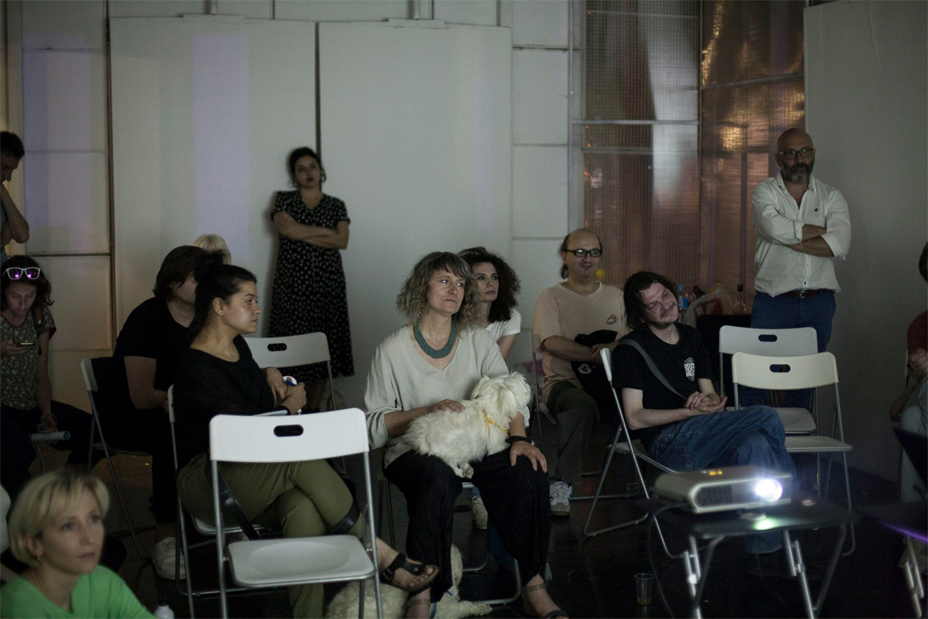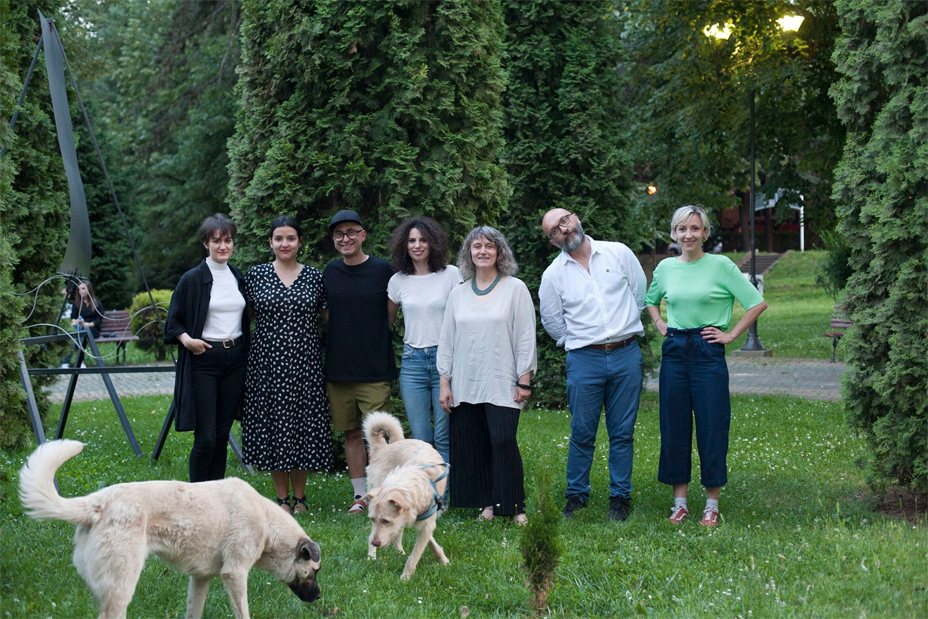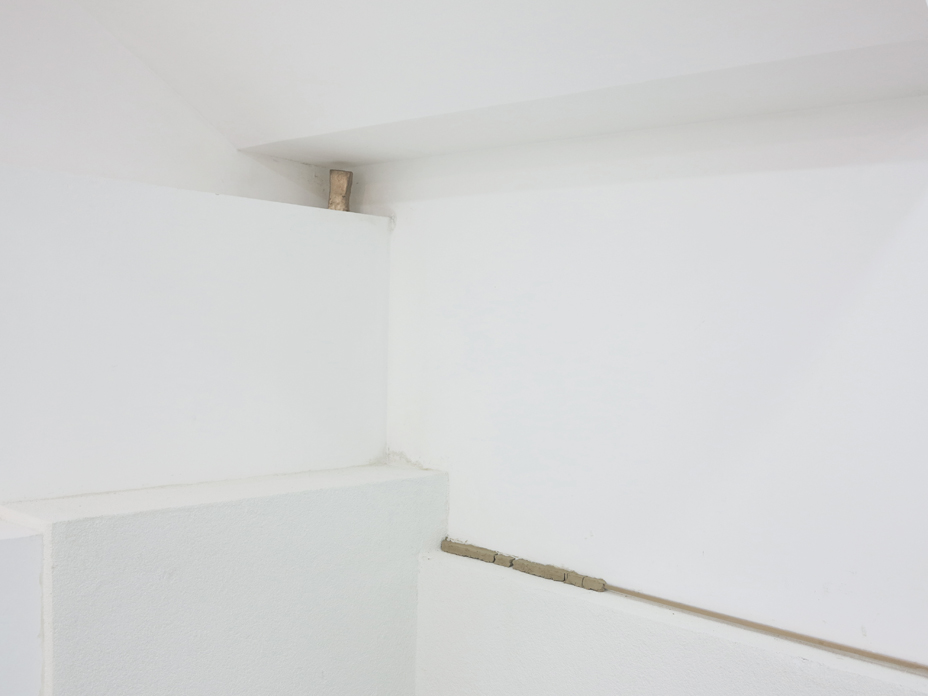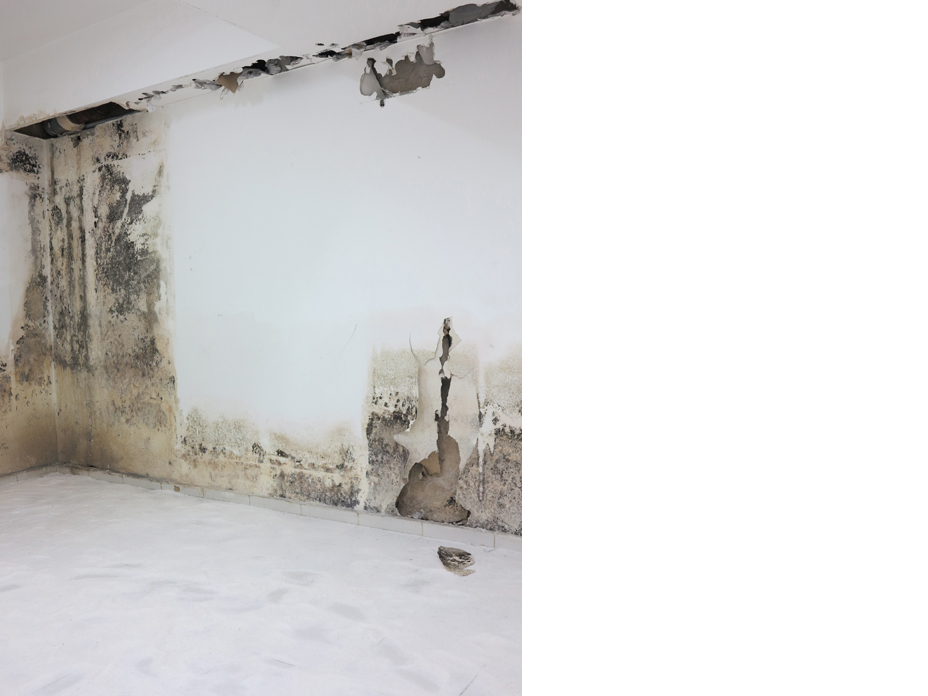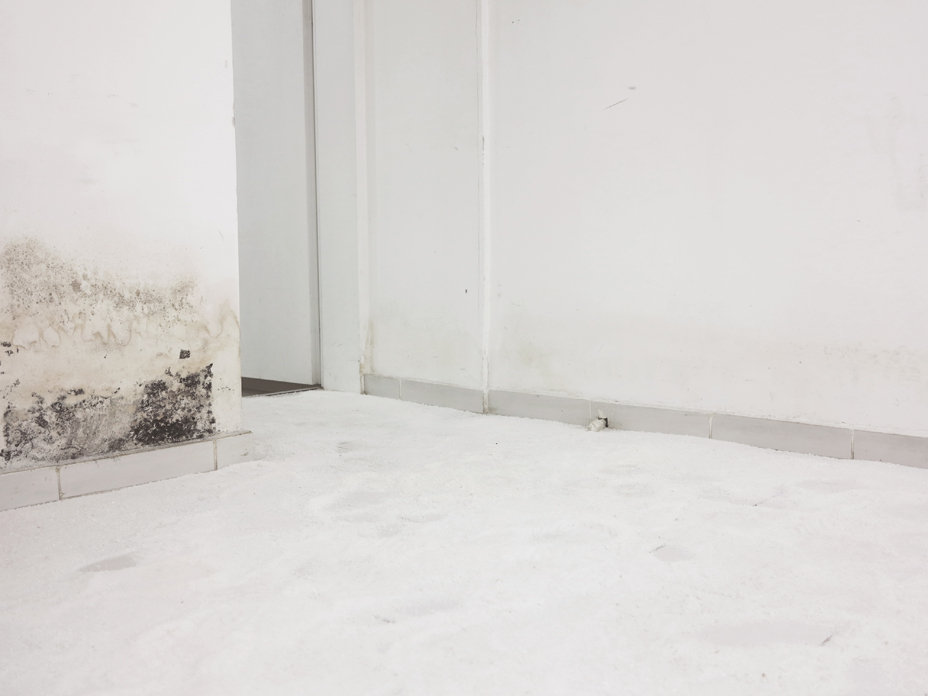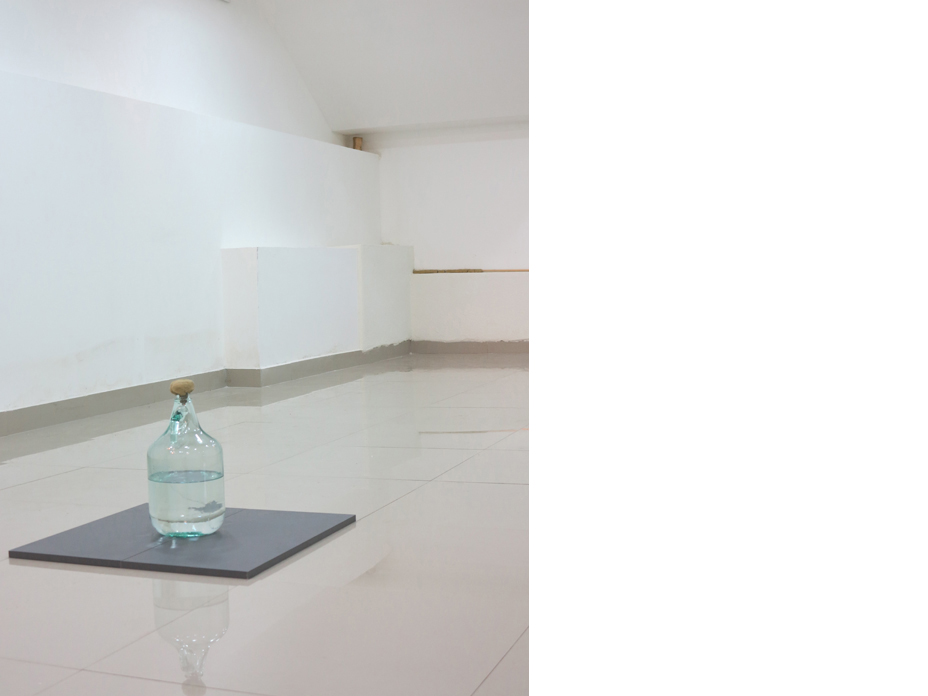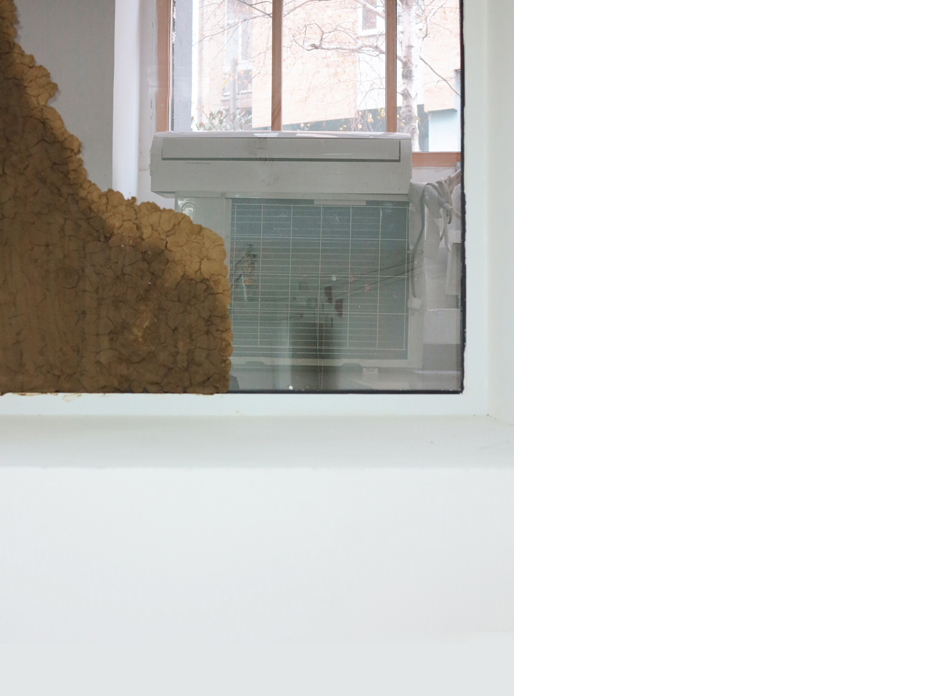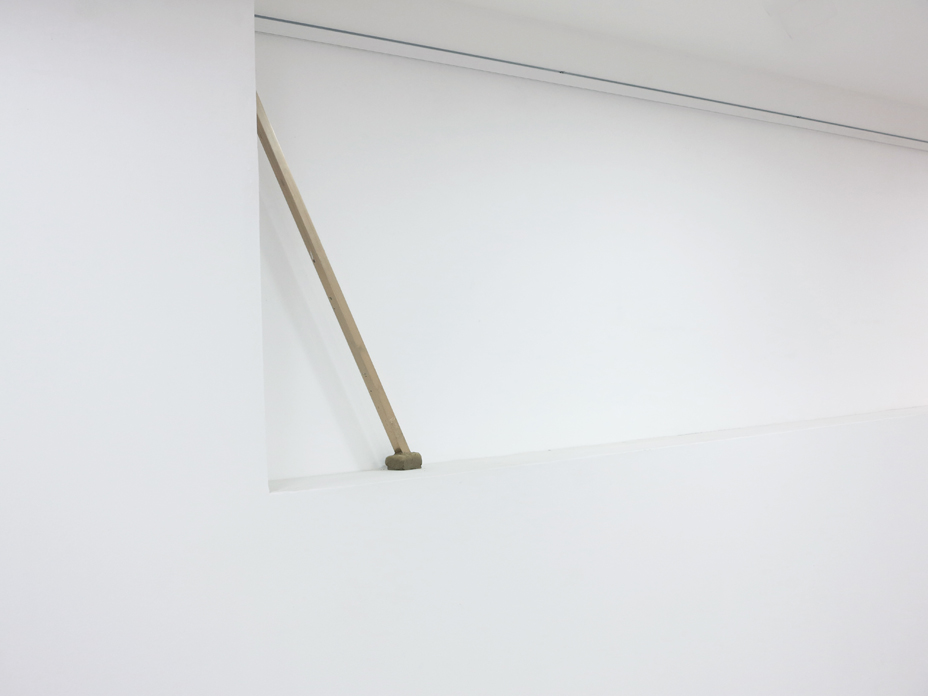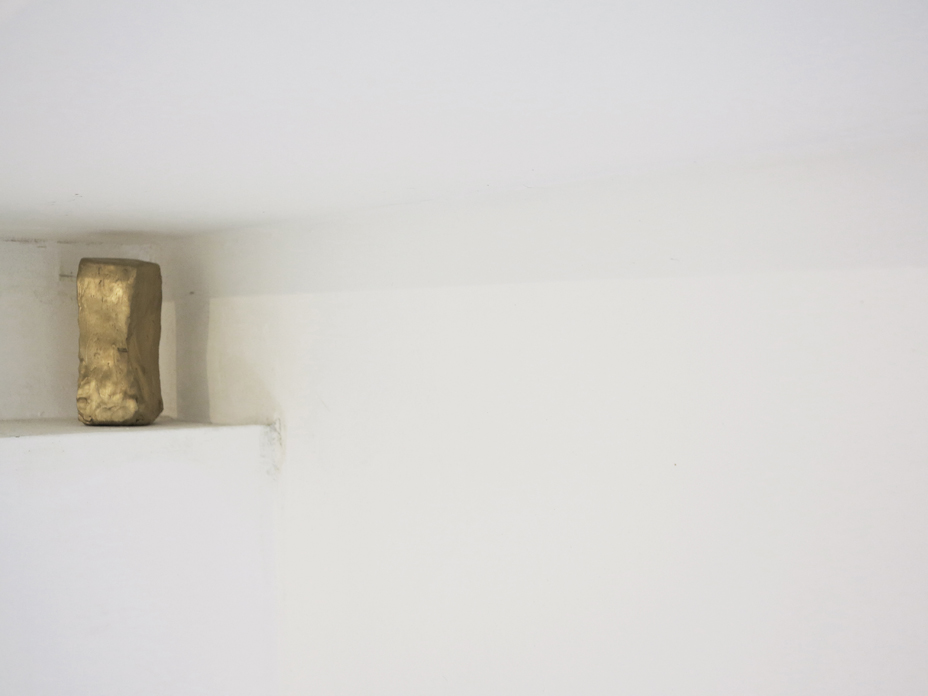Hey, What do We Have to Lose?
Artistic Process between Activism and the Archival, A digital exhibition.
How do we deal with the inexhaustibility of individual and collective memories? To what part of the past do we give "advantage" over the rest, and strive to "embody" through a work, text, or speech? How does documentary change art? How can the archive, through different practices, correspond to modern times? In what art forms and ways can it be represented? And finally, how can the archive lead to the opening of the imaginative and fictive space? These are a few questions addressed through the exhibition "Hey, What do We Have to Lose?" envisioned to present the works of the artists Antonis Pittas, Tjaša Kalkan, and Yane Calovski at the State Hydrometeorological Institute in Skopje, and that focuses on the ways in which the artists interrogate the past and how art's methodology contributes to new historical and cultural interpretations of the present.
The exhibited works involve artistic research in an interdisciplinary manner that deals with the politics of forgetting, manipulating memory depending on current political and ideological needs. In addition to referring to the present, they are consequently related to notions experienced through narratives, memories, artifacts, and documents - historical testimonies of the past. The focus of the artistic research is the lost modernist heritage erased as a result of the expansion of Skopje 2014, a governmental project that reflects the nationalistic, authoritarian regime, populism, and hegemony.
Hito Steyerl argues that in a documentary work there is no intention of distorting the authentic truth of the political, but rather of changing the "politics of truth" on which its representation is based. The visual and epistemological formations of documentary writing are thus defined as functions of the political. If the archive is a place where the documentary constitutes a space of memory, or a concept that relates to a knowledge resource produced for the past, its other aspect is the "living" memory that is in the process of being constantly questioned depending on the current and contemporary. The archive work in this context is subversive, which means that its task is to challenge the hegemony of certain historical and ideological constructions. Rather than a set of documents and collective knowledge of a particular culture or period, it is treated more in terms of relationships that define certain attitudes and discourses, i.e., as a means of forming and transforming attitudes.
Jovanka Popova
Antonis Pittas
One of the exhibiting artists, Antonis Pittas, is known for creating context-sensitive art installations inspired by architecture, art-historical references, performative aspects of installation art and its social dynamics. Pittas explores topics such as safety and control, economic crises and acts of resistance, as well as violence and vandalism. Reflecting on the Skopje 2014 project, his work archives, documents, and reproduces materials from its production and manifestation.
The artist discovers and photographs material failures found on newly erected monuments from the Skopje 2014 project, which are the opposite of the tacit knowledge of the modernist past that has been erased in recent years by the production of a fake history through the visual manifestations of the project. This found and documented material, as a trace of a political past, witnesses and records a social and creative loss and refuses to forget what is being forgotten. Conceptual links between archival methodology and the physical durability of the cheap, fake materials used for the newly erected monuments and buildings have been articulated and used by the artist in order to materially preserve selective transience and present-day accelerations of historical loss. Hence, his archival work produces an oppositional history beyond official narratives and, combined with text, acts as a site of resistance that seeks to create a new, useful history.
Tjaša Kalkan
Similarly, Tjaša Kalkan, analytical in her artistic approach, uses irony to defuse the pervasive commercialization and the increasing regulation of public space. In the context of the same Skopje 2014 project, more than twenty thousand citizens were subject to direct illegal surveillance as part of an alleged criminal conspiracy by the right-wing government. Referring to the notion that, like the state, the camera is never neutral, Tjaša constructs a space in which the camera, made by the artist herself in new-baroque style, refers to the atmosphere of surveillance by the authorities and points to the visual absurdity and grotesqueness of the new public space.
Her work presents a new archive of the ephemeral, based on a multitude of voices, that exposes the "society of control" in which our past actions are archived so that our present activities can be surveilled and our future behaviors predicted. Records, similar to archives, are a powerful tool for imposing control, where some are in a position to maintain records and some are not; some voices can be heard and some not at all; certain opinions about society will be privileged and others marginalized. The new approach to archiving afforded by social networks creates the possibility of a democratized narrative in which the stories of citizens whose opinions are ignored by the creators of public politics and who are cast to the periphery of mainstream histories can be told, and through which the boundaries between the creators of the records and history and their audience might be inverted.
Yane Calovski
Yane Calovski's architecturally inspired installations combine modernist archives with empirical ideas situated in the sitespecificity of diverse cultural, social, and political geographies. While engaging various research and production applications, augmenting a method similar to the immediacy of drawing and durational installations, he constructs ambiguous and unresolved visual and archival entities.
The installation is part of his ongoing project Undisciplined: A Construction of an Archive, started in May 2017. The main goal of the project is to reset some of the collected, unprotected, and chemically contaminated printed materials of the former Institute for Urban Planning and Architecture in Skopje (ZUAS), which caught fire in April 2017. In the process of collecting, thinking, mapping, digitizing, and associative development of all available materials, Calovski creates new drawings and objects and unleashes the project in three processes: (1) archivism - archiving, activism, and advocacy; (2) publishing - disclosure, reading, and filming; (3) exposure - visual isolation, manufacturing, and sharing.
The new possibilities that this installation offer as archival art, is to turn transience into becoming, replacing the failed loss from everyday life with new alternative types of social engagement that transform the historical site (here, the lost archive) into a construction site (the new work of art). This progressive approach actually leads to producing new culture that sees history as more than just a loss. Achille Mbembe points to the archive's power as an "instituting imaginary" that stems from its co-ownership of dead time (the past or cultural memory) and living time (communicative memory).
Hence, the project questions the possibilities of the aesthetic, which in relation to the archival and forgetting produce new remembrance. Hence, the exhibition functions as an archival art. It not only presents artistic and critical practices and tools that develop an awareness of social conditions, but also points to the continuity of artistic and critical engagement that evolves through new concepts, new instruments, and new forms in order to support the productive position of art in constant antithesis to ideologically and politically determined processes in society. These private archives question public ones: they can be seen as subversions that disturb the symbolic and also point to a general crisis in this social law that emerges out of the notion of failure in cultural memory. And in the wider sociocultural context, the works of Pittas, Kalkan, and Calovski question the role of the artist in complex sociopolitical developments, both in the past and in the present.
How do we deal with the inexhaustibility of individual and collective memories? To what part of the past do we give "advantage" over the rest, and strive to "embody" through a work, text, or speech? How does documentary change art? How can the archive, through different practices, correspond to modern times? In what art forms and ways can it be represented? And finally, how can the archive lead to the opening of the imaginative and fictive space? These are a few questions addressed through the exhibition "Hey, What do We Have to Lose?" envisioned to present the works of the artists Antonis Pittas, Tjaša Kalkan, and Yane Calovski at the State Hydrometeorological Institute in Skopje, and that focuses on the ways in which the artists interrogate the past and how art's methodology contributes to new historical and cultural interpretations of the present.
The exhibited works involve artistic research in an interdisciplinary manner that deals with the politics of forgetting, manipulating memory depending on current political and ideological needs. In addition to referring to the present, they are consequently related to notions experienced through narratives, memories, artifacts, and documents - historical testimonies of the past. The focus of the artistic research is the lost modernist heritage erased as a result of the expansion of Skopje 2014, a governmental project that reflects the nationalistic, authoritarian regime, populism, and hegemony.
Hito Steyerl argues that in a documentary work there is no intention of distorting the authentic truth of the political, but rather of changing the "politics of truth" on which its representation is based. The visual and epistemological formations of documentary writing are thus defined as functions of the political. If the archive is a place where the documentary constitutes a space of memory, or a concept that relates to a knowledge resource produced for the past, its other aspect is the "living" memory that is in the process of being constantly questioned depending on the current and contemporary. The archive work in this context is subversive, which means that its task is to challenge the hegemony of certain historical and ideological constructions. Rather than a set of documents and collective knowledge of a particular culture or period, it is treated more in terms of relationships that define certain attitudes and discourses, i.e., as a means of forming and transforming attitudes.
Jovanka Popova
Antonis Pittas
One of the exhibiting artists, Antonis Pittas, is known for creating context-sensitive art installations inspired by architecture, art-historical references, performative aspects of installation art and its social dynamics. Pittas explores topics such as safety and control, economic crises and acts of resistance, as well as violence and vandalism. Reflecting on the Skopje 2014 project, his work archives, documents, and reproduces materials from its production and manifestation.
The artist discovers and photographs material failures found on newly erected monuments from the Skopje 2014 project, which are the opposite of the tacit knowledge of the modernist past that has been erased in recent years by the production of a fake history through the visual manifestations of the project. This found and documented material, as a trace of a political past, witnesses and records a social and creative loss and refuses to forget what is being forgotten. Conceptual links between archival methodology and the physical durability of the cheap, fake materials used for the newly erected monuments and buildings have been articulated and used by the artist in order to materially preserve selective transience and present-day accelerations of historical loss. Hence, his archival work produces an oppositional history beyond official narratives and, combined with text, acts as a site of resistance that seeks to create a new, useful history.
Tjaša Kalkan
Similarly, Tjaša Kalkan, analytical in her artistic approach, uses irony to defuse the pervasive commercialization and the increasing regulation of public space. In the context of the same Skopje 2014 project, more than twenty thousand citizens were subject to direct illegal surveillance as part of an alleged criminal conspiracy by the right-wing government. Referring to the notion that, like the state, the camera is never neutral, Tjaša constructs a space in which the camera, made by the artist herself in new-baroque style, refers to the atmosphere of surveillance by the authorities and points to the visual absurdity and grotesqueness of the new public space.
Her work presents a new archive of the ephemeral, based on a multitude of voices, that exposes the "society of control" in which our past actions are archived so that our present activities can be surveilled and our future behaviors predicted. Records, similar to archives, are a powerful tool for imposing control, where some are in a position to maintain records and some are not; some voices can be heard and some not at all; certain opinions about society will be privileged and others marginalized. The new approach to archiving afforded by social networks creates the possibility of a democratized narrative in which the stories of citizens whose opinions are ignored by the creators of public politics and who are cast to the periphery of mainstream histories can be told, and through which the boundaries between the creators of the records and history and their audience might be inverted.
Yane Calovski
Yane Calovski's architecturally inspired installations combine modernist archives with empirical ideas situated in the sitespecificity of diverse cultural, social, and political geographies. While engaging various research and production applications, augmenting a method similar to the immediacy of drawing and durational installations, he constructs ambiguous and unresolved visual and archival entities.
The installation is part of his ongoing project Undisciplined: A Construction of an Archive, started in May 2017. The main goal of the project is to reset some of the collected, unprotected, and chemically contaminated printed materials of the former Institute for Urban Planning and Architecture in Skopje (ZUAS), which caught fire in April 2017. In the process of collecting, thinking, mapping, digitizing, and associative development of all available materials, Calovski creates new drawings and objects and unleashes the project in three processes: (1) archivism - archiving, activism, and advocacy; (2) publishing - disclosure, reading, and filming; (3) exposure - visual isolation, manufacturing, and sharing.
The new possibilities that this installation offer as archival art, is to turn transience into becoming, replacing the failed loss from everyday life with new alternative types of social engagement that transform the historical site (here, the lost archive) into a construction site (the new work of art). This progressive approach actually leads to producing new culture that sees history as more than just a loss. Achille Mbembe points to the archive's power as an "instituting imaginary" that stems from its co-ownership of dead time (the past or cultural memory) and living time (communicative memory).
Hence, the project questions the possibilities of the aesthetic, which in relation to the archival and forgetting produce new remembrance. Hence, the exhibition functions as an archival art. It not only presents artistic and critical practices and tools that develop an awareness of social conditions, but also points to the continuity of artistic and critical engagement that evolves through new concepts, new instruments, and new forms in order to support the productive position of art in constant antithesis to ideologically and politically determined processes in society. These private archives question public ones: they can be seen as subversions that disturb the symbolic and also point to a general crisis in this social law that emerges out of the notion of failure in cultural memory. And in the wider sociocultural context, the works of Pittas, Kalkan, and Calovski question the role of the artist in complex sociopolitical developments, both in the past and in the present.
(Un)disciplined:
A Construction of An Archive
A Construction of An Archive
(Un)disciplined: A Construction of An Archive is a year-long curated
program produced in the context of the international project Collective Domain
of Cultural Memory (CDCM).
The International Symposium titled: Hey, What Do We Have to Lose? Archiving as a Collective Act of Resistance, will examine deviant processes of archiving as a collective act using key notions of fragmentation, discontinuity, contingency and consistency of action.
The prelude of the idea is an incident from April 21st, 2017 when a fire destroyed the Institute for Town Planning and Architecture in Skopje. Located in a set of barracks from the 1960s, the institute housed an archive of the post-earthquake reconstruction of Skopje (1963). The archive of the institute, consisting of plans, memos, reports, booklets, books, urbanism studies and models, all very much related to the modernist Macedonian architectural heritage, was badly damaged by flames, smoke and water, and was left for grabs by passersby. The devastation was complete without the civil duty to clean up and organize. In absence of institutional duty for organizing and clearing, the damage was of enormous dimension.
After the fire, Press to Exit Project Space along with local and international artists and state institutions such as the State Archive and the Museum of the City of Skopje, organized an action to clean up and secure some of the devastated documents and objects from further damage. This gesture and the collected documents will be the starting point for the Macedonian program of CDCM. When we experience loss of something associated with our collective history, whether it is a document, a building or a person, we feel that we have lost our footing both in the present and the future; it is a disconcerting, disorienting and ultimately, debilitating experience.
The project proposes concepts of acting together and imagining the future of this archive by working with the concept of (de)modernization of the past marred with institutional/systematic neglect of modern architectural heritage in post-socialist Macedonia. The ideology of commemorating and archiving is also directly set inside the actual absence of an archive.
One of the key questions is how processes of fragmentation, discontinuity, contingency, multiplicity, consistency and associations, ultimately can be applied in re-contextualizing the process and visualization of the burned books, maps, reports and other collected materials. These artifacts remain guided by our collective memories proposing a different, more disassociated logic of archiving.
Yane Calovski and Hristina Ivanoska
Exhibition
Undisciplined: A Construction of An Archive #2
May 31st - June 15th, 2019
Collaborative exhibition, curated by Jovanka Popova (MK)
Artists: Antonis Pittas (NL), Tjaša Kalkan (HR) and Yane Calovski (MK)
The exhibition (Un)disciplined: A Construction of An Archive, that is envisioned to present three works of the artists Antonis Pittas, Tjaša Kalkan and Yane Calovski at the Museum of Contemporary Art in Skopje, focuses on the ways in which the artists interrogate the past and how art's methodology contributes to new historical and cultural interpretation of the present.
The exhibited works recall to the events and social relations from the past, and provoke the present, by involving artistic research in an interdisciplinary manner that deals with historical gaps, silences and fragmented narration as a result from ideological forms of history writing.
Hence, the project questions the ways in which artists engage with complexities of hegemonic ways of dealing with oppressed cultural narratives; the approaches towards forgetting by interpreting the memory politics; the ways in which artistic inventions fulfills the lack of archiving methods; the possibilities of art interventions against the process of overwritten histories and political manipulations; The three artists in the show are also conducting a two weeks long production-inresidence in Skopje. The artists additionally will develop ephemeral installations throughout the city including the Mobile Gallery of Contemporary Art Centre at the Park of the Francophone.
Antonis Pittas addresses contemporary social and political issues, at the same time his work is characterised by historical awareness. More an observer than an activist, Pittas explores topics such as safety and control, economic crises and acts of resistance, as well as violence and vandalism. He has a context sensitive practice whose focal point is directed at targeting such moments as a gesture of public discontent, unrest or simply the need for expression of ones personal creativity.
Pittas usually develops mixed-media installations and spatial adaptations that provides a context for interpretation. Starting point for his residence in Skopje is his project Hybrid 2018. In the context of the city of Skopje, he brings issues of the public space in connection with questions of power and responsibility.
Tjaša Kalkan, analytical in her artistic approach, uses irony to defuse the pervasive commercialization and the increasing regulation of public space. Starting point for her residency in Skopje is the work Sunset Beach, that writer Stasa Aras has called 'a contemporary absurdist play' seen as an act of resistance to commercialization and devastation of space and a 'fine-packed horror that we consume by participating in it'.
She ultimately subverts photography as both a documentary medium and one of illusions, adapting her lens to see beyond the capitalist values of progress that have become the norm in post-socialist / neo-liberal capitalist societies.
Yane Calovski's architecturally inspired installations combine modernist archives with empirical ideas situated in the site-specifcity of diverse cultural, social and political geographies. The conceptual elasticity in converging legacy of architectural modernity, notion of performativity, usage of archives and addressing current socio-cultural, economic and political conditions has been in the centre of his artistic practice for many years. While engaging various research and production applications, augmenting a method similar to the immediacy of drawing and durational installations, he construct ofen ambiguous and unresolved visual and archival entities. The current work interconnects modernist architectural narratives that belong to the city of Skopje guided by a non-linear historical time in which our collective memories remain in a state of continual flux.
The International Symposium titled: Hey, What Do We Have to Lose? Archiving as a Collective Act of Resistance, will examine deviant processes of archiving as a collective act using key notions of fragmentation, discontinuity, contingency and consistency of action.
The prelude of the idea is an incident from April 21st, 2017 when a fire destroyed the Institute for Town Planning and Architecture in Skopje. Located in a set of barracks from the 1960s, the institute housed an archive of the post-earthquake reconstruction of Skopje (1963). The archive of the institute, consisting of plans, memos, reports, booklets, books, urbanism studies and models, all very much related to the modernist Macedonian architectural heritage, was badly damaged by flames, smoke and water, and was left for grabs by passersby. The devastation was complete without the civil duty to clean up and organize. In absence of institutional duty for organizing and clearing, the damage was of enormous dimension.
After the fire, Press to Exit Project Space along with local and international artists and state institutions such as the State Archive and the Museum of the City of Skopje, organized an action to clean up and secure some of the devastated documents and objects from further damage. This gesture and the collected documents will be the starting point for the Macedonian program of CDCM. When we experience loss of something associated with our collective history, whether it is a document, a building or a person, we feel that we have lost our footing both in the present and the future; it is a disconcerting, disorienting and ultimately, debilitating experience.
The project proposes concepts of acting together and imagining the future of this archive by working with the concept of (de)modernization of the past marred with institutional/systematic neglect of modern architectural heritage in post-socialist Macedonia. The ideology of commemorating and archiving is also directly set inside the actual absence of an archive.
One of the key questions is how processes of fragmentation, discontinuity, contingency, multiplicity, consistency and associations, ultimately can be applied in re-contextualizing the process and visualization of the burned books, maps, reports and other collected materials. These artifacts remain guided by our collective memories proposing a different, more disassociated logic of archiving.
Yane Calovski and Hristina Ivanoska
Exhibition
Undisciplined: A Construction of An Archive #2
May 31st - June 15th, 2019
Collaborative exhibition, curated by Jovanka Popova (MK)
Artists: Antonis Pittas (NL), Tjaša Kalkan (HR) and Yane Calovski (MK)
The exhibition (Un)disciplined: A Construction of An Archive, that is envisioned to present three works of the artists Antonis Pittas, Tjaša Kalkan and Yane Calovski at the Museum of Contemporary Art in Skopje, focuses on the ways in which the artists interrogate the past and how art's methodology contributes to new historical and cultural interpretation of the present.
The exhibited works recall to the events and social relations from the past, and provoke the present, by involving artistic research in an interdisciplinary manner that deals with historical gaps, silences and fragmented narration as a result from ideological forms of history writing.
Hence, the project questions the ways in which artists engage with complexities of hegemonic ways of dealing with oppressed cultural narratives; the approaches towards forgetting by interpreting the memory politics; the ways in which artistic inventions fulfills the lack of archiving methods; the possibilities of art interventions against the process of overwritten histories and political manipulations; The three artists in the show are also conducting a two weeks long production-inresidence in Skopje. The artists additionally will develop ephemeral installations throughout the city including the Mobile Gallery of Contemporary Art Centre at the Park of the Francophone.
Antonis Pittas addresses contemporary social and political issues, at the same time his work is characterised by historical awareness. More an observer than an activist, Pittas explores topics such as safety and control, economic crises and acts of resistance, as well as violence and vandalism. He has a context sensitive practice whose focal point is directed at targeting such moments as a gesture of public discontent, unrest or simply the need for expression of ones personal creativity.
Pittas usually develops mixed-media installations and spatial adaptations that provides a context for interpretation. Starting point for his residence in Skopje is his project Hybrid 2018. In the context of the city of Skopje, he brings issues of the public space in connection with questions of power and responsibility.
Tjaša Kalkan, analytical in her artistic approach, uses irony to defuse the pervasive commercialization and the increasing regulation of public space. Starting point for her residency in Skopje is the work Sunset Beach, that writer Stasa Aras has called 'a contemporary absurdist play' seen as an act of resistance to commercialization and devastation of space and a 'fine-packed horror that we consume by participating in it'.
She ultimately subverts photography as both a documentary medium and one of illusions, adapting her lens to see beyond the capitalist values of progress that have become the norm in post-socialist / neo-liberal capitalist societies.
Yane Calovski's architecturally inspired installations combine modernist archives with empirical ideas situated in the site-specifcity of diverse cultural, social and political geographies. The conceptual elasticity in converging legacy of architectural modernity, notion of performativity, usage of archives and addressing current socio-cultural, economic and political conditions has been in the centre of his artistic practice for many years. While engaging various research and production applications, augmenting a method similar to the immediacy of drawing and durational installations, he construct ofen ambiguous and unresolved visual and archival entities. The current work interconnects modernist architectural narratives that belong to the city of Skopje guided by a non-linear historical time in which our collective memories remain in a state of continual flux.
Symposium
Hey, what do we have to lose?
Archiving as a collective act of resistance
Hey, what do we have to lose?
Archiving as a collective act of resistance
Day I (31.05.2019)
Museum of Contemporary Art Skopje
Working language: English
20:00 Welcome address and introduction of the program and guests by Yane Calovski and Hristina Ivanoska
20:15 Panel I
Presentations and discussion with Sabina Sabolovic (HR), Charles Esche (NL), Sebastian Cichocki (PL), moderated by Yane Calovski (MK)
22:00 DJ Set / Party with Sonja Ismail
Day II (01.06.2019)
Museum of Contemporary Art Skopje
Working languages: English and Macedonian
12:00 Welcome coffee with the artists
Antonis Pittas(NL) and Tjaša Kalkan(HR) /
12:30 Panel II
Presentations and discussion with Natasa Bodrozic (HR), Marjoca de Greef and Anastasija Pandilovska (NL/MK), Yane Calovski and Hristina Ivanoska (MK)
13:30 Book launch: Consumer Culture Landscapes In Socialist Yugoslavia
by the project Motel Trogir
14:15 Short break
14:30 Panel III
Presentations and discussions with Jasminka Namicheva, Museum of the City of Skopje (NMK), Suzana Stamboliska Mechevska, State Archive of the Republic of North Macedonia (NMK), Vase Amanito Petrovski, photographer (NMK), Lidija Pajevikj photograph conservator (NMK), Vlado Danailov, architect (NMK), Noemi Chausidis, architect (NMK), moderated by Klelija Zhivkovikj
16:30 Lunch / Informal conversations
17:30 End of program
Day III (11.06.2019)
Mobile Gallery, Contemporary Art Center, Skopje
20:00 Presentations and discussions with
Tjaša Kalkan(HR) and
Antonis Pittas (NL/GR)
Main venue and partnership:
Museum of Contemporary Art Skopje
Additional program venues and partnership:
Mobile Gallery, Contemporary Art Center CAC Skopje
Socio-Cultural Space 'Centar-Jadro', Skopje
Museum of the City of Skopje (MGS)
State Archive of the Republic of North Macedonia
PR Manager: Ivana Tasev
Collaborator: Ivan Pesevski
Overall design of the project: Anastasija Pandilovska
> Press release and more project information
Museum of Contemporary Art Skopje
Working language: English
20:00 Welcome address and introduction of the program and guests by Yane Calovski and Hristina Ivanoska
20:15 Panel I
Presentations and discussion with Sabina Sabolovic (HR), Charles Esche (NL), Sebastian Cichocki (PL), moderated by Yane Calovski (MK)
22:00 DJ Set / Party with Sonja Ismail
Day II (01.06.2019)
Museum of Contemporary Art Skopje
Working languages: English and Macedonian
12:00 Welcome coffee with the artists
Antonis Pittas(NL) and Tjaša Kalkan(HR) /
12:30 Panel II
Presentations and discussion with Natasa Bodrozic (HR), Marjoca de Greef and Anastasija Pandilovska (NL/MK), Yane Calovski and Hristina Ivanoska (MK)
13:30 Book launch: Consumer Culture Landscapes In Socialist Yugoslavia
by the project Motel Trogir
14:15 Short break
14:30 Panel III
Presentations and discussions with Jasminka Namicheva, Museum of the City of Skopje (NMK), Suzana Stamboliska Mechevska, State Archive of the Republic of North Macedonia (NMK), Vase Amanito Petrovski, photographer (NMK), Lidija Pajevikj photograph conservator (NMK), Vlado Danailov, architect (NMK), Noemi Chausidis, architect (NMK), moderated by Klelija Zhivkovikj
16:30 Lunch / Informal conversations
17:30 End of program
Day III (11.06.2019)
Mobile Gallery, Contemporary Art Center, Skopje
20:00 Presentations and discussions with
Tjaša Kalkan(HR) and
Antonis Pittas (NL/GR)
Main venue and partnership:
Museum of Contemporary Art Skopje
Additional program venues and partnership:
Mobile Gallery, Contemporary Art Center CAC Skopje
Socio-Cultural Space 'Centar-Jadro', Skopje
Museum of the City of Skopje (MGS)
State Archive of the Republic of North Macedonia
PR Manager: Ivana Tasev
Collaborator: Ivan Pesevski
Overall design of the project: Anastasija Pandilovska
> Press release and more project information
May 31, June 1 and June 11 2019
Museum of Contemporary Art Skopje
Mobile Gallery, Contemporary Art Center, Skopje
Museum of Contemporary Art Skopje
Mobile Gallery, Contemporary Art Center, Skopje
Exhibition: For there was nothing, but
matters touching, matters talking
matters touching, matters talking
By attentively investigating the House of Culture "Koco Racin" in Skopje and its historical meaning as a home and a place that was initiated to nurture culture, Anastasija Pandilovska employs the space and invites it to be part of her composition. She uses the built environment as a supporting structure that gives space to the construction and perception of meaning. Pandilovska bends the act of molding matter into a communal gesture to set the space in motion. She stirs space and by doing this she makes space and explores the possibility
for the locus to become a work on its own. For there was nothing, but
matters touching, matters talking influences the proximity of the visitor
so as to return to the meaning of giving a home to culture.
The projects are kindly supported by:

The projects are kindly supported by:







